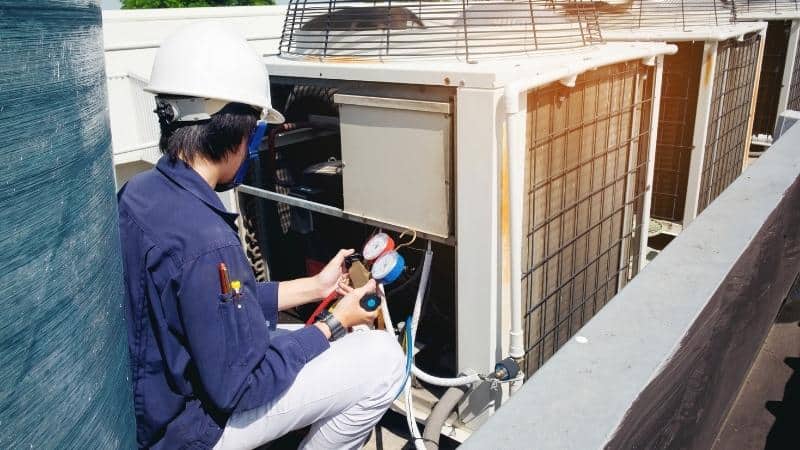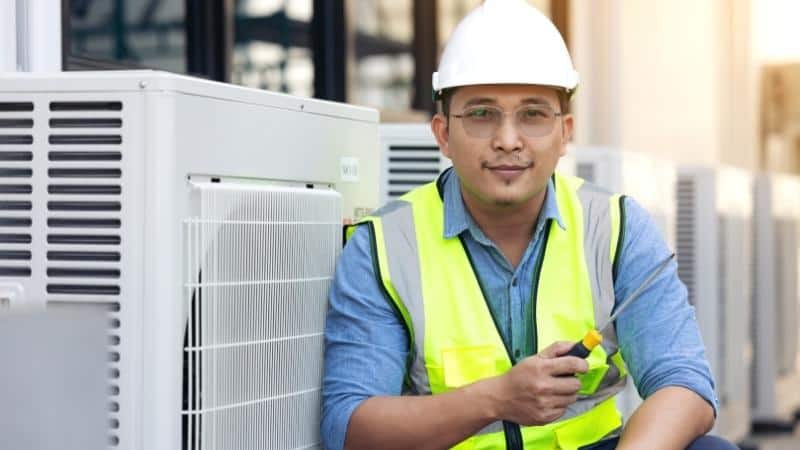Cars running by fuel, mobile phones running on batteries, men living by food— if you consider all these phenomena, you will find them very similar. Because each of them is surviving on something. A car is useless without fuel, a mobile phone is dark without batteries and a man meets death without food.
That’s one of the reasons why these factors are always monitored. A car has a fuel gauge to check on fuel, a mobile phone or laptop has a battery bar on its screen which shows the user how much battery life remains in percentage, and a man, well, doesn’t have a meter, gauge, or any indicators outside to check his hunger as his body checks every second for what he needs and what he doesn’t. At the end of the day, someone/something checks for the thing that the subject has to live on.
An air conditioner is no different. Because it runs on gas, and occasionally, you have to check for it to ensure you have a comfortable environment.
How does an air conditioner use the gas?
Many people think that an air conditioner is used to keep your environment cool but, in another perspective, an air conditioner provides the exact environment that you desire. It does this by setting up the temperature of a closed environment. Now, everything considered, how does an air conditioner, a machine, fixes the temperature for you?
If you are feeling hot, the system inside the air conditioner releases a refrigerant that begins to absorb the heat in your surroundings which is then left outside the environment in the form of hot air. This causes the temperature to gradually drop and you begin to feel cold, or less hot. What if you are getting cold though? Then, the air conditioner just releases lesser refrigerant, and so lesser heat is thrown outside, keeping the room warm in the process.
This refrigerant, however, is technically a liquid substance. So, where is the gas that the air conditioner uses? The refrigerant eventually undergoes a transformation of liquid to gas during heat absorption. Several refrigerants have been used for air conditioners over the years, such as chlorofluorocarbons (CFCs), hydrochlorofluorocarbons (HCFCs), hydrofluorocarbons (HFCs), and hydrocarbons (HCs). CFCs were initially used a lot, but since the discovery of them being a threat because of their greenhouse effects and ozone layer depletion events, they have been banned in several countries. Now, hydrocarbons are used because, currently, they are the most environmental-friendly refrigerant.

How to check gas in the air conditioner?
Whenever your air conditioner is not working up to your expectations, only then do you usually have to check on the gas. There are many ways through which you can check gas in your home air conditioner before you hand it over to a professional. These ways are based on assumptions from different experiences of air conditioning failures from the experts themselves, so you should be able to figure out whether the air conditioner is low on gas or is it the systems that are malfunctioning. It is still recommended to allow a specialist to observe after you are done with your ways.
1) Sometimes, the fan of the air conditioner may stop rotating. You may assume that it’s because of the low gas or no gas, but mostly it’s a motor fault. What you can do is, turn on the air conditioner couple of times and observe if it moves. Do not ever decide to put your hands in the fan because that’s extremely dangerous. If you are confirmed that it’s the fan that needs repairing, contact an expert.
2) One of the reasons for air conditioners running low besides low gas is dirty air filters. Cleaning the filters often solves the problem because there are possibilities of the cooling system being blocked off. If you are comfortable with this job then you can do it easily, just make sure the air conditioner is turned off before you go to work. Otherwise, you can call for an air conditioner servicing company that provides cleaners.
3) Leakage of liquified refrigerant, i.e., before becoming gas, can be a big reason for air conditioner not working properly. This is also a wastage of the refrigerant; therefore, you will be running out of gas earlier than you are supposed to. Fortunately, the leakage causes frost to develop on certain parts of the system such as motor and tubes and they are quite visible when it happens. Contact an expert immediately if you notice such things.
4) The air conditioner may stop functioning properly all of a sudden without any visible signs. However, you should know that there is always a condition to why it may happen. So, instead of just looking, try to hear your air conditioner too. If you catch any ‘hissing’ noise, that should mean the system is low on gas for some reason; normally, it’s because of a massive leakage. More specifically, try to search for the noise around the refrigerant line. Once you have found the spot, contact an expert.
5) If you have checked your air conditioner for leakages and haven’t found any, and if you have cleaned the filters and every part of the system inside, if the air conditioner is still not working properly, you can resort to the electronic detectors as your last option. The detectors will inform you about any hidden leakage or blockage through thermal scanning, which is why they are quite expensive too. If you still find nothing, that should confirm that your air conditioner needs recharging of gas.
As you can see, there is no specific process through which you can check gas on your air conditioner. Until the air conditioner shows anything improper in its job, you have to stay put. Those ways are only for your confirmation whether the appliance is low on gas or not. If you are not so concerned about it though, it’s fine to just contact a servicing company to deal with it. They can take the proper decisions for you for a small wager.
